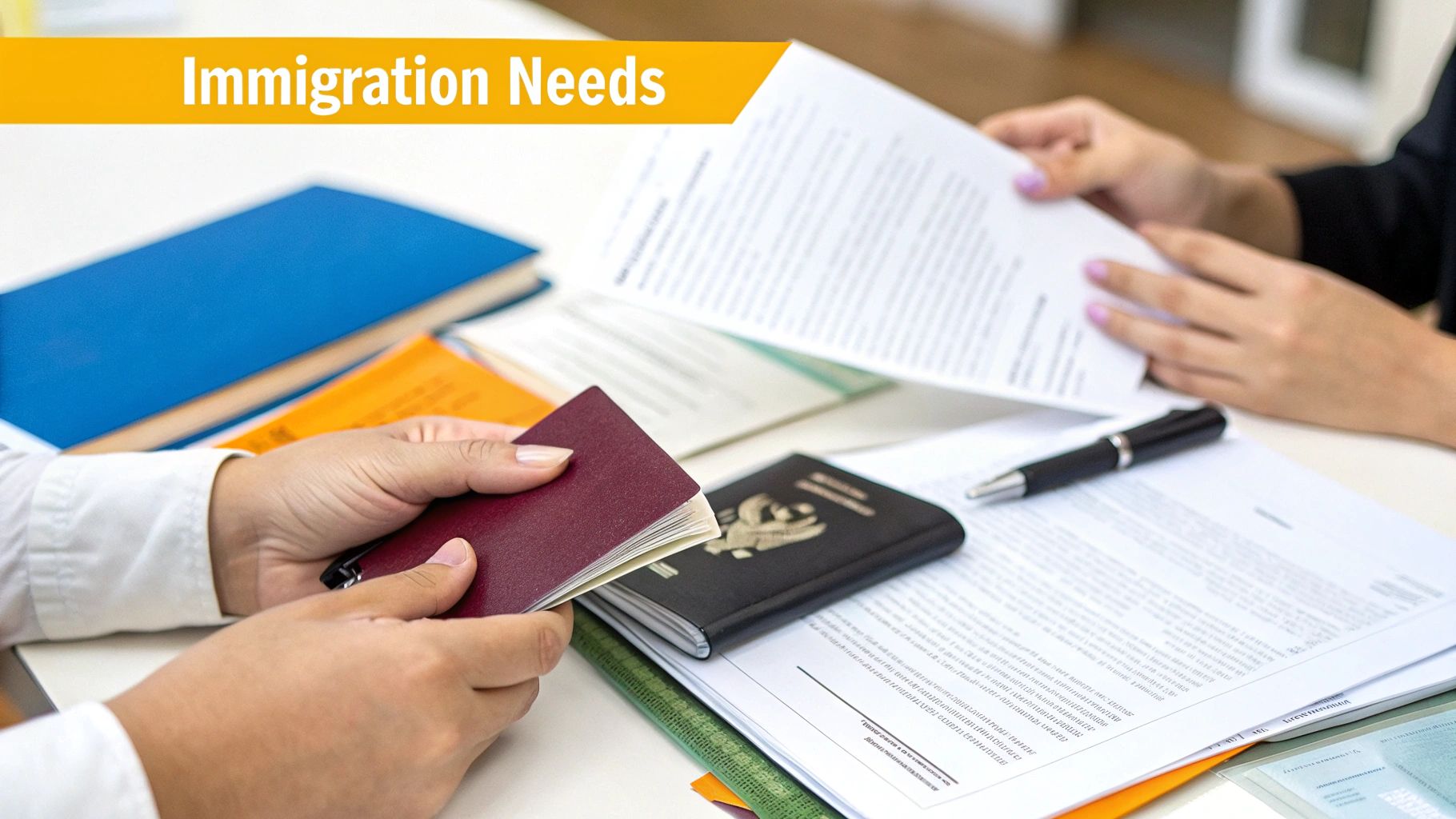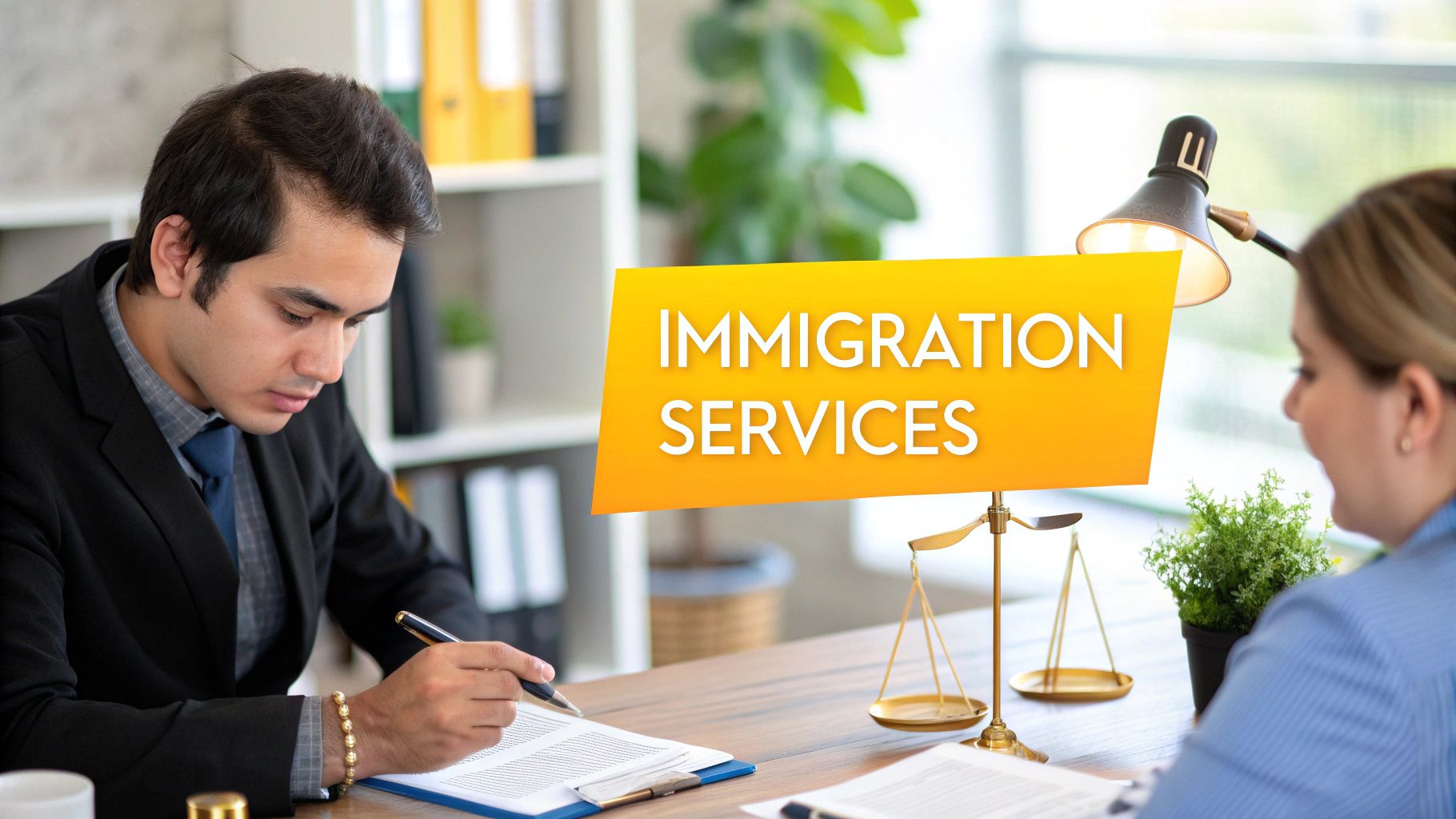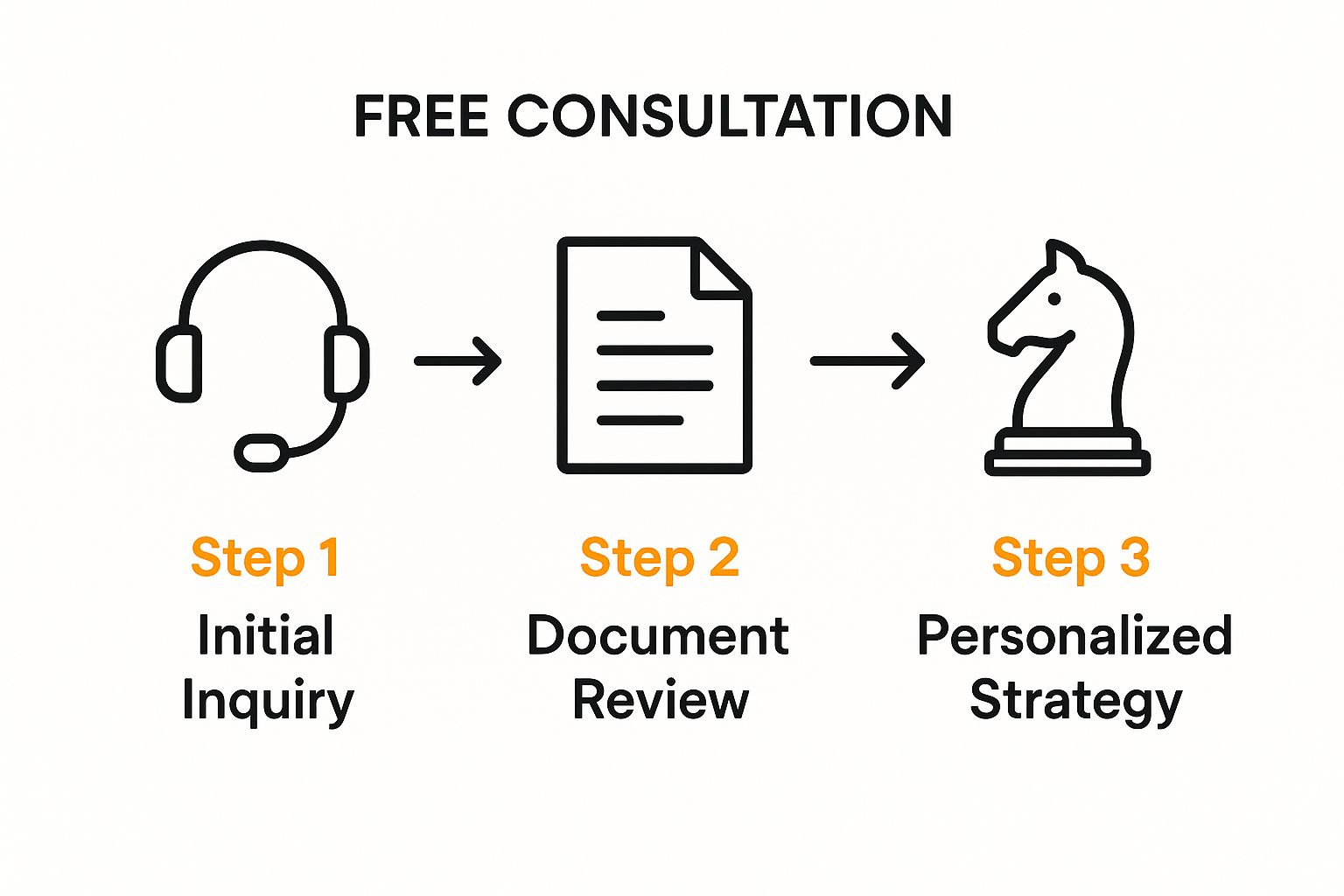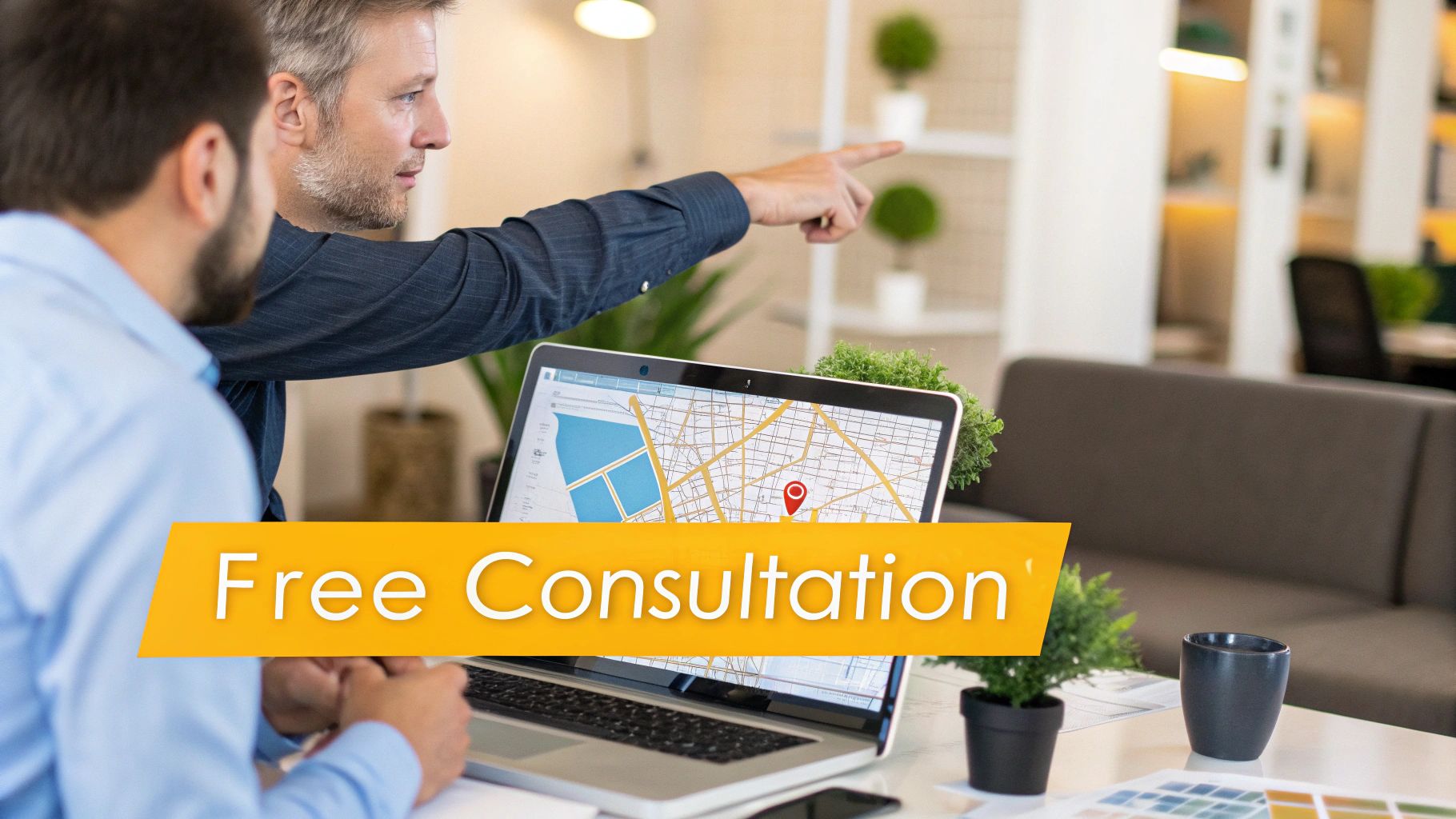Find an Immigration Lawyer Near Me Free Consultation
Navigating Canada’s immigration system can feel like trying to solve a puzzle with half the pieces missing. Finding the right legal help is often the most critical first step, and starting with an “immigration lawyer near me free consultation” isn’t just a Google search—it’s your first strategic move. It gives you a chance to get a professional read on your case without any upfront financial pressure, setting you up for success right from the start.
The Real Value of a Free Immigration Consultation
Embarking on your journey to Canada is a massive undertaking, and the lawyer you choose will be your most important partner. A free consultation is far more than a way to save a bit of cash; think of it as your first, no-risk opportunity to vet a potential guide for this complex process.

This initial chat is essentially an interview—and you’re the one hiring. It’s your chance to see if you click with their communication style and, more importantly, if they have a track record with cases just like yours.
What to Expect (and What Not to Expect)
It’s crucial to walk into this meeting with the right mindset. The main goal here is a preliminary review of your situation. The lawyer wants to understand the basics of your case to see if they can genuinely help you.
This isn’t the time for deep, detailed legal strategizing that you’d get after signing a retainer agreement. You’ll leave with a better sense of your possible pathways, not a fully mapped-out application plan. Knowing this helps you make the most of the time you have.
It’s also important to understand the typical differences between a free chat and a full, paid legal consultation.
What to Expect From a Free vs Paid Immigration Consultation
| Feature | Free Consultation | Paid Consultation |
|---|---|---|
| Purpose | Preliminary case assessment and lawyer evaluation. | In-depth legal advice and strategic planning. |
| Duration | Typically 15-30 minutes. | Usually 30-60 minutes or longer. |
| Depth of Advice | General overview of eligibility and potential options. | Detailed analysis of your case, specific document review. |
| Outcome | A general sense of direction and whether the lawyer is a good fit. | Actionable next steps, a clear strategy, and answers to complex questions. |
| Follow-Up | A proposal or retainer agreement if they take your case. | Often includes a summary of advice and a detailed quote for services. |
Seeing the differences laid out like this helps you prepare the right questions and manage your expectations for that first meeting.
A free consultation is your opportunity to gauge a lawyer’s expertise and determine if they are the right fit for your unique Canadian immigration journey. It’s a no-risk way to get a professional first opinion on your eligibility and options.
Your Chance to Interview the Expert
Remember, this is a two-way street. While the lawyer is figuring out if they can take your case, you’re figuring out if you want them to. You need to probe their experience with the specific Canadian immigration streams that apply to you.
Do they have real-world experience with things like:
- Navigating the Express Entry pool and the Comprehensive Ranking System (CRS)?
- Specific Provincial Nominee Programs (PNPs), like those for Ontario, British Columbia, or Alberta?
- The ins and outs of Family Sponsorship applications, from spousal to parental sponsorships?
- Tougher files, like overcoming inadmissibility issues or previous application refusals from Immigration, Refugees and Citizenship Canada (IRCC)?
For example, if you’re a tech worker in Toronto aiming for the Ontario Immigrant Nominee Program (OINP), don’t be shy. Ask the lawyer directly about their success rate with that particular stream. This initial talk is your best shot at making an informed decision and finding someone with the exact skills you need to reach your goals in Canada.
Finding Reputable Canadian Lawyers Who Offer Free Consultations
Knowing where to look is half the battle when you’re trying to connect with a qualified professional. Instead of just typing “immigration lawyer” into a search engine and hoping for the best, it’s far smarter—and safer—to start with official, trusted Canadian resources.
This isn’t just about finding a name; it’s about making sure you’re dealing with someone who is licensed, insured, and accountable. The single most reliable place to begin this search is with the provincial law society where you live.
Start with Provincial Law Society Directories
Every single lawyer in Canada has to be a member in good standing of a law society in the province or territory where they practise. Think of these societies as the official gatekeepers of the legal profession, and thankfully, they all maintain public directories.
These databases are much more than just a list of names. They’re verification tools. You can instantly confirm a lawyer is licensed to practise, find their contact info, and, most importantly, check for any disciplinary history. This is your best defence against unauthorized representatives—often called “ghost consultants”—who operate outside the law.
Here’s how to get the most out of these directories:
- Filter by Specialization: Most directories let you search by “Area of Practice” or “Specialty.” Choose “Immigration Law” right away to narrow down the list to lawyers who actually focus on this complex field.
- Verify Their Status: When you find a name, click on their profile. It should clearly state they are a “practising lawyer” and have no suspensions or restrictions on their record.
- Location-Based Search: If meeting in person is important to you, use the directory’s search filters to find a lawyer located right in your city or region.
For example, the directories for the Law Society of Ontario or the Law Society of British Columbia are excellent starting points for building your initial list. Following this process guarantees you’re starting your search with legitimate, regulated professionals from the get-go.
Your provincial law society directory is the gold standard for verifying a lawyer’s credentials. It’s a crucial first step to ensure you’re connecting with a licensed professional who is authorized to provide legal advice on Canadian immigration matters.
Explore Non-Profit and Legal Aid Options
Private law firms aren’t your only option. Across Canada, you’ll find a number of non-profit organizations and community legal aid clinics that offer immigration services.
Now, not all of them offer free consultations to the general public, but many do provide pro bono (free) services or initial meetings for low-income individuals or refugees. These organizations are often funded by government grants or donations and are dedicated to helping those who need it most. They can be a fantastic resource if you meet their criteria.
A quick search for “community legal clinic immigration services” in your city is a great way to uncover these local support systems. For more guidance on where to find these services, you can explore additional information on Canadian legal aid resources.
By using these trusted channels, you’re not just randomly picking names; you’re building a high-quality shortlist of potential lawyers. Once you have that list, the next step is to visit their websites or call their offices to ask directly about their policy on free consultations for new immigration clients. This methodical approach ensures you invest your time speaking only with qualified and reputable experts.
How to Vet a Lawyer Before You Book the Meeting
So, you’ve got a shortlist of potential lawyers. Great! Before you start booking those free consultations, a bit of upfront homework can save you a world of time and stress down the road. This is all about making sure you’re only meeting with credible professionals who are actually a good fit for your Canadian immigration case.

Before you even think about picking up the phone, your first and most critical move is to check their credentials. This is non-negotiable. Every lawyer practising in Canada must be a registered and insured member of their provincial or territorial law society.
Head straight to the public directory on the law society’s website for the province where the lawyer practises. Punch in their name and confirm their status is listed as “practising” or “in good standing.” This simple check is your first line of defence against scams and ensures you’re dealing with a legitimate, licensed professional.
Scrutinize Their Online Presence
Once you’ve confirmed they’re licensed, it’s time to check out their professional website. A well-maintained site is often a good indicator of a well-run practice. You’re not looking for flashy designs; you’re looking for proof of real expertise.
Does the website scream “Canadian immigration law”? It should. Look for dedicated pages that break down their experience with different Immigration, Refugees and Citizenship Canada (IRCC) programs, like Express Entry, Provincial Nominee Programs (PNPs), or family sponsorships. Many firms also introduce their legal team, giving you a glimpse into their backgrounds and specific focus areas. To see a great example of this, you can learn more about a firm’s practitioners on their professional team page.
Next, hunt for online reviews on Google or legal-specific directories. Read them with a healthy dose of skepticism. A couple of negative reviews aren’t always a dealbreaker—sometimes things just don’t work out. What you’re looking for are patterns. If you see consistent complaints about poor communication, missed deadlines, or surprise fees, that’s a major concern.
A huge red flag to watch for is any lawyer or firm that guarantees a successful outcome. The Canadian immigration system is complex, and the final decision always rests with IRCC officers. Ethical professionals will promise to represent you diligently and skillfully, but they will never, ever guarantee an approval.
Identify and Avoid Red Flags
As you do your digging, keep your eyes peeled for warning signs. Your goal is to find someone trustworthy and professional, not someone who makes you feel cornered or uneasy.
Be wary of these red flags:
- High-Pressure Sales Tactics: If their office pressures you to pay a fee or sign a retainer on the spot, that’s your cue to leave. A reputable professional will give you the space to make an informed decision.
- Vague “Jack-of-all-Trades” Experience: Steer clear of lawyers who are generalists but claim they “also do” immigration. This area of law is incredibly nuanced; you need a specialist who lives and breathes it.
- Murky Fee Structures: If their website is completely silent on how they charge for services beyond the initial consultation, it might hint at a lack of transparency later on.
This screening process might feel like a lot of work, but trust me, it’s an invaluable step. It ensures that when you finally do book that consultation, you’re investing your time wisely with a legitimate, experienced professional who can actually help.
Preparing for Your Consultation to Get Maximum Value
A free consultation is your golden ticket to a lawyer’s undivided attention, even if it’s just for a short time. To really make the most of it, you need to walk in prepared. Think of it this way: the more organized you are, the faster the lawyer can get up to speed on your situation and give you actual, useful advice.
Your job is to make every minute count. That means doing a bit of homework beforehand, like getting your documents in order and being ready to explain your story clearly. When you show up prepared, it signals to the lawyer that you’re serious about your case, which helps them focus on what matters.
Gather Your Essential Documents
Before you even think about heading to your appointment, you’ll want to pull together all your key paperwork. Having these documents ready means the lawyer can look at real information, not just rely on what you remember. It saves a ton of time and prevents any guesswork.
You don’t need your entire life story in a binder, but here are the must-haves:
- Identification: This is the big one. Bring your passport and any current Canadian visas or permits you hold, like a study permit, work permit, or visitor record.
- Immigration History: Dig up any past applications you’ve filed with Immigration, Refugees and Citizenship Canada (IRCC). This includes any letters, decisions, or—especially important—refusal notices you’ve received.
- Supporting Credentials: Depending on your goals, you might need your Educational Credential Assessment (ECA) report, language test results (IELTS or CELPIP), and an up-to-date resumé.
- Family Information: If you’re planning to include family members in your application, have their documents handy too—things like passports, birth certificates, and marriage certificates.
Having your paperwork in order helps the lawyer move straight to building a strategy for you, which is exactly what you want.

As you can see, a little organization creates a direct path to a meaningful conversation instead of getting bogged down in basic fact-finding.
Craft Your Immigration Story
Lawyers are always short on time, so being able to explain your situation quickly and clearly is a huge advantage. Before your meeting, try jotting down a short summary of your immigration journey and what your goals are.
Think of it as your one-minute “case pitch.” Touch on the important stuff: key dates, what kind of status you’ve had in Canada, any applications you’ve tried before, and what you’re ultimately aiming for. Maybe it’s permanent residence through Express Entry, sponsoring a spouse, or dealing with an inadmissibility issue. A clear summary lets the lawyer dive right in.
When you can lay out your story concisely, the lawyer can spend less time asking “what happened next?” and more time analyzing your options. That’s how you squeeze every bit of value out of a short, free meeting.
Prepare a List of Critical Questions
Remember, this consultation isn’t just for the lawyer to assess you; it’s your chance to interview them. Coming in with a list of questions is the best way to make sure you don’t forget anything important. You’ll want to focus on things that tell you about their experience, how they work, and what their fees look like if you decide to hire them.
Asking sharp, practical questions will help you figure out if they’re the right fit for you and your case. It also shows you’ve done your homework and are taking this process seriously.
To help you get started, here is a table of essential questions to guide your conversation. These are designed to help you dig deeper than just a surface-level chat and truly evaluate if this is the right legal expert for your journey.
Essential Questions to Ask During Your Free Consultation
| Category | Question to Ask | Why It’s Important |
|---|---|---|
| Experience & Specialisation | ”How many cases similar to mine have you handled, and what were the outcomes?” | This reveals their direct experience with your specific immigration pathway and sets realistic expectations. |
| Case Strategy | ”Based on what I’ve told you, what do you see as the biggest strengths and weaknesses of my case?” | A good lawyer should be able to offer a quick, honest preliminary assessment, showing they understand the nuances. |
| Process & Communication | ”If I hire you, who will be my main point of contact, and how often can I expect updates?” | This clarifies who will be handling your file (the lawyer or a paralegal) and sets communication standards from the start. |
| Fees & Retainer | ”Could you provide a breakdown of your fees? Do you work on a flat-fee or hourly basis?” | Understanding the full cost is crucial. Asking for a breakdown helps avoid hidden fees or surprises later on. |
| Next Steps | ”What would be the immediate next steps if we decide to move forward together?” | This question tests their readiness and gives you a clear picture of the initial actions they would take on your file. |
Having these questions ready will give you the confidence to lead the conversation and gather the information you need to make an informed decision. After all, choosing the right lawyer is one of the most important steps in your entire immigration process.
After the Consultation: Making Your Decision
Alright, the free consultation is over. You’ve hung up the phone or left the office, your head buzzing with information. What now? This is where the real decision-making begins, moving from fact-finding to taking that next big step on your Canadian immigration path.
Don’t let those valuable insights fade. Grab your notes while everything is still fresh in your mind. If you spoke with a couple of different lawyers, now’s the time to compare them head-to-head. A simple pros-and-cons list for each can work wonders.
Evaluating Your Options
Choosing an immigration lawyer is about more than just credentials; it’s about finding a guide you can trust with one of the biggest moves of your life. It’s easy to be swayed by a friendly personality, but you need to look deeper at the practical side of things.
Think back on each conversation and ask yourself a few tough questions:
- Did they really know their stuff? How confidently did they talk about Canadian immigration law? If you mentioned a specific program, like the Federal Skilled Worker Program or a spousal sponsorship, did they seem to know it inside and out, or were they a bit vague?
- Was their strategy clear? A great lawyer can take a complicated legal process and break it down into simple, understandable steps. You should have left the meeting feeling enlightened, not more confused than when you started.
- How did you feel talking to them? This is a big one. You’re going to be working with this person for a while, sharing personal details and trusting their advice. Did you feel comfortable asking questions, or did you feel rushed or intimidated?
Ultimately, you’re looking for that perfect blend of professional expertise and personal chemistry. Who didn’t just tell you what to do, but made you feel confident that you could get it done together?
The right lawyer doesn’t just have the experience on paper. They have a knack for making the complex feel manageable, empowering you with clarity and confidence. That ability is just as crucial as their legal knowledge.
Understanding the Retainer Agreement
Once you’ve picked your lawyer, the next official step is signing the retainer agreement. Think of this as more than just a piece of paper; it’s the formal contract that kicks off your professional relationship. It’s your safety net, and you should never, ever move forward without one.
This document is designed to protect both of you by making sure everyone is on the same page from day one. Before you put pen to paper, read it carefully. Look for a clear breakdown of the scope of work. It should spell out exactly what services you’re paying for—is it just filling out the application, or does it include all communication with Immigration, Refugees and Citizenship Canada (IRCC) too?
The section on fees is especially critical. The agreement has to be crystal clear about the cost structure. Are you paying a flat fee for the whole process or an hourly rate? It should also detail what’s included, what isn’t (like government filing fees), and when payments are due. A transparent, detailed retainer agreement is the sign of a true professional you can count on.
Common Questions About Free Immigration Consultations in Canada
Even after doing your homework, it’s natural to have a few questions buzzing around. Finding the right legal partner for your Canadian immigration journey can feel like a huge task, but clearing up these common points of confusion will help you move forward with confidence.

Let’s dive into some of the questions we hear all the time from people searching for an “immigration lawyer near me free consultation.” Getting these answers straight will make your search much more focused and effective.
Lawyers vs. Regulated Consultants: What’s the Difference?
One of the first hurdles is figuring out whether you need a lawyer or a consultant. It’s a common mix-up. While both can represent you with Immigration, Refugees and Citizenship Canada (IRCC), their roles, training, and the scope of what they can do are quite different.
- Immigration Lawyer: A lawyer is a member of their provincial or territorial law society. They’ve gone to law school and can handle absolutely every aspect of your immigration file. This includes complex cases and, importantly, representing you in appeals before the Federal Court of Canada if things get complicated.
- Regulated Canadian Immigration Consultant (RCIC): An RCIC belongs to the College of Immigration and Citizenship Consultants (CICC). They are fully authorized to give advice and manage most IRCC applications. However, their authority typically stops short of representing you in court.
Knowing this from the start helps you pick the right professional for your situation. If you anticipate any potential for legal appeals, a lawyer is your safest bet.
What if No Local Lawyers Offer Free Consultations?
So, you’ve searched your local area and come up empty. No one seems to be offering that free first meeting. Don’t get discouraged! Your options are much broader than you think.
Thanks to video and phone calls, many of Canada’s best immigration lawyers now offer virtual consultations. This instantly expands your search from just your town to the entire province, opening the door to a much larger pool of experienced professionals. Another route is to look for a lawyer who offers a paid consultation at a reasonable flat rate. The personalized, in-depth advice you’ll get in that first hour can be an invaluable investment in your future.
A free consultation is really a high-level screening. The lawyer is sizing up your case to see if they can help, and you’re getting a feel for their style and expertise. Deep, specific legal advice is almost always reserved for clients who have signed on formally.
What Does “Free” Actually Get You?
It’s really important to have the right expectations for a free consultation. This isn’t a session where you’ll walk away with a complete, step-by-step legal roadmap for your entire case. It’s much more like a preliminary check-up.
During the meeting, the lawyer will listen to the basics of your story, spot any obvious pathways or potential red flags, and decide if they’re a good fit for your needs. You’ll get a general idea of your options and a first impression of the lawyer’s approach. For more answers to common queries, feel free to look through our comprehensive immigration FAQ page. Going in with realistic expectations helps you make the most of this valuable opportunity.
At UL Lawyers Professional Corporation, we know that beginning your immigration journey is one of the biggest steps you’ll ever take. Our experienced legal team is here to offer the clear, compassionate, and expert guidance you deserve. We provide free consultations to help you map out your options and take that first confident step toward your Canadian dream. Connect with us today to see how we can help. https://ullaw.ca
Related Resources
Living Will Ontario: A Complete Guide to Advance Directives
Continue reading Living Will Ontario: A Complete Guide to Advance DirectivesPower of Attorney vs Guardianship in Ontario Explained
Continue reading Power of Attorney vs Guardianship in Ontario ExplainedNEED A LAWYER?
We are here 24/7 to address your case. You can speak with a lawyer to request a consultation.
905-744-8888GET STARTED WITH A FREE CONSULTATION
Why Choose UL Lawyers
- Decades of combined experience
- Millions recovered for our clients
- No fee unless we win your case
- 24/7 client support
- Personalized legal strategies